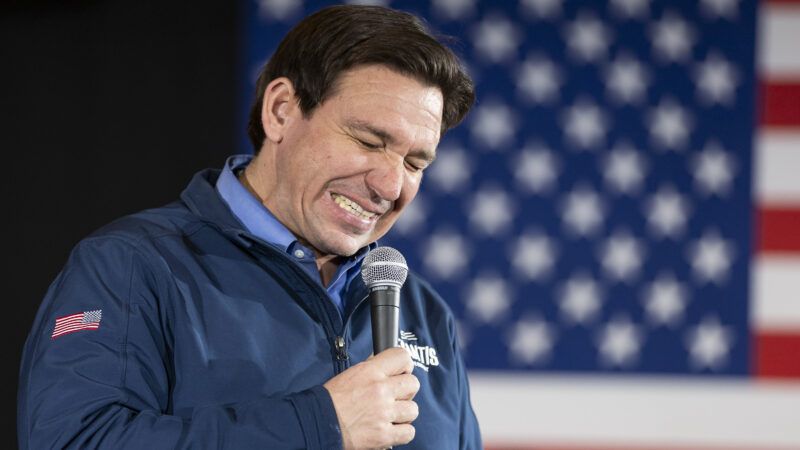DeSantis Rightly Rejects GOP Bill To Help Fund Trump's Legal Defense
It is not the job of Florida taxpayers to support state officials' preferred presidential candidates.

A recent Florida bill would have required taxpayers to partially fund former President Donald Trump's mounting legal fees, reinvigorating a niche debate within the state's Republican party over how and if the government should funnel public funds toward politicians.
Senate Bill 1740, introduced by State Sen. Ileana Garcia (R–District 36), proposed to create the "Defending Freedom Fighters Trust Fund," extending up to $5 million in "grants for victims of political discrimination." How would the government decide who qualified? Florida's Department of Financial Services, according to the legislation, would have "the sole authority to determine if a person has been subject" to such prejudice, concentrating that power in the hands of Jimmy Patronis, the state's chief financial officer.
"We need this Freedom Fighters Fund because as the Free State of Florida, we're facing an onslaught of attacks from the federal government against the Sunshine State," Patronis said in a press release. "If we can help and support a Florida candidate for the White House, that's just good from a dollars and cents perspective."
When considering that Patronis' job is to be a responsible steward of public funds, the "dollars and cents perspective" should indeed be his lodestar. But that's also why he should have reached the opposite conclusion, as it is not the job of Florida taxpayers to support Patronis' preferred candidates. It is also not their job to pay a portion of a former president's legal fees, particularly when that person has a reported net worth of $2.6 billion.
S.B. 1740 proposed extracting money from the state's controversial campaign matching funds program, which offers taxpayer dollars to candidates running for statewide office. It was created to give more opportunities to insufficiently funded hopefuls and reduce the sway of wealthy donors. Perhaps ironically, lawmakers recently voted to advance a constitutional amendment that would dissolve that very program. "I believe we should put the question back to the voters to see if they would like us to spend general revenue on things other than advertising for statewide office," said State Sen. Travis Hutson, a Republican representing St. Augustine.
Whether or not that program is fulfilling its original mission is a matter of debate. Gov. Ron DeSantis was the top recipient when he ran for governor in 2018, pocketing $3.2 million in public funds. He received even more in 2022, taking $3.35 million, while Charlie Crist and Nikki Fried, who vied for the Democratic nomination in that election, received $964,646 and $634,092, respectively. One wonders if taxpayers really need to be giving millions of dollars to an incumbent governor, who is not exactly an underdog in Florida.
But DeSantis did not support extending those dollars toward Trump, who is neither a candidate for statewide office, nor is he insufficiently funded. Should the bill reach DeSantis' desk, he said, he would veto it.
Garcia responded by withdrawing the bill. "My concern was the political weaponization against conservative candidates," she wrote. She is certainly entitled to that opinion. But she is not entitled to make her constituents pay for it.


Show Comments (34)